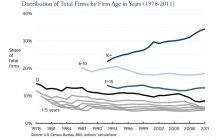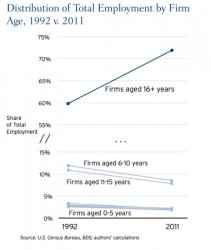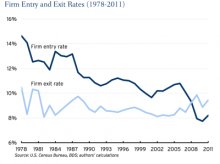Startups in the New economy
 A few months ago, I asked a simple question: “Can Google ever be beat?” The query was less about Google itself, and more a question about the potential of startups to disrupt the largest companies in our economy. Do we have the talent and capital infrastructure needed for nascent companies to grow and compete against mature incumbents? I argued strongly that we do not, but I based my analysis on conversations and impressions from my interviews and experience in Silicon Valley rather than from economy-wide data.
A few months ago, I asked a simple question: “Can Google ever be beat?” The query was less about Google itself, and more a question about the potential of startups to disrupt the largest companies in our economy. Do we have the talent and capital infrastructure needed for nascent companies to grow and compete against mature incumbents? I argued strongly that we do not, but I based my analysis on conversations and impressions from my interviews and experience in Silicon Valley rather than from economy-wide data.
Now two researchers have released a report from Brookings looking into the issue of business maturity in America. The results are, unfortunately, deeply disturbing for those who care about the future of the startup industry.
The authors, Ian Hathaway and Robert Litan, used U.S. Census data to investigate the age structure of firms in the economy and how that structure has changed over time.
 Their results show clearly that America’s firms are getting older on average. Take a look at this graph of the changing percentage of firms at different age levels. The proportion of firms greater than 16 years of age has increased significantly over the past two decades, appearing to be mostly at the expense of startups with less than five years of operations.
Their results show clearly that America’s firms are getting older on average. Take a look at this graph of the changing percentage of firms at different age levels. The proportion of firms greater than 16 years of age has increased significantly over the past two decades, appearing to be mostly at the expense of startups with less than five years of operations.
Another angle the authors study is the percentage of the labor force that works at mature companies compared to startups. Again, the results are not positive. As the second graph above summarizes, older firms are now employing a greater percentage of Americans than they were in 1992 — 77% of all workers, in fact, if you include government employees into the analysis, up from 67%.
Hathaway and Litan note that this observation is not limited to a single market or industry. “Perhaps more surprising is the sheer pervasiveness of this trend, which is occurring in every U.S. state and nearly every metropolitan area, across all firm size categories and broad industrial segments; even in high- tech.”
That last comment may be surprising walking around San Francisco these days, given that it seems like every building, nook, and cranny has some sort of startup working out of it (a dentist’s office I visited even had a startup working from the closet).
That makes it a bit harder to swallow the study’s conclusion that entrepreneurship is declining in America. The authors plotted the number of new firm formations over time, and noted a continuing decrease in the formation rate as can be seen in the final chart included above. This is less the case in Silicon Valley than it is in the rest of the economy (from CrunchBase data or other local data sources), but even here the trend is quite visible. With the exception of Facebook and Salesforce (which is 15 years old), nearly every major Silicon Valley company is older than 16 years.
Companies act like humans when it comes to these sorts of population statistics. The more young companies that are launched and incubated, the more mature companies that will be in existence in ten to twenty years, mediated by a failure rate (or the death rate in the case of humans). If there are less firms being created, then over time we would expect that the average maturity of firms to increase. Indeed, the study observes the interesting parallel between the age structure of firms and the same age structure of people in the United States.
You might also like
#CPHFTW goes live - becomes more than a meetup — ArcticStartup
.. something that can benefit all startups, both big and small. -. This article is in collaboration with Øresund Startups, originally by Karsten Deppert and covers news about startups and events from the startup scene.





